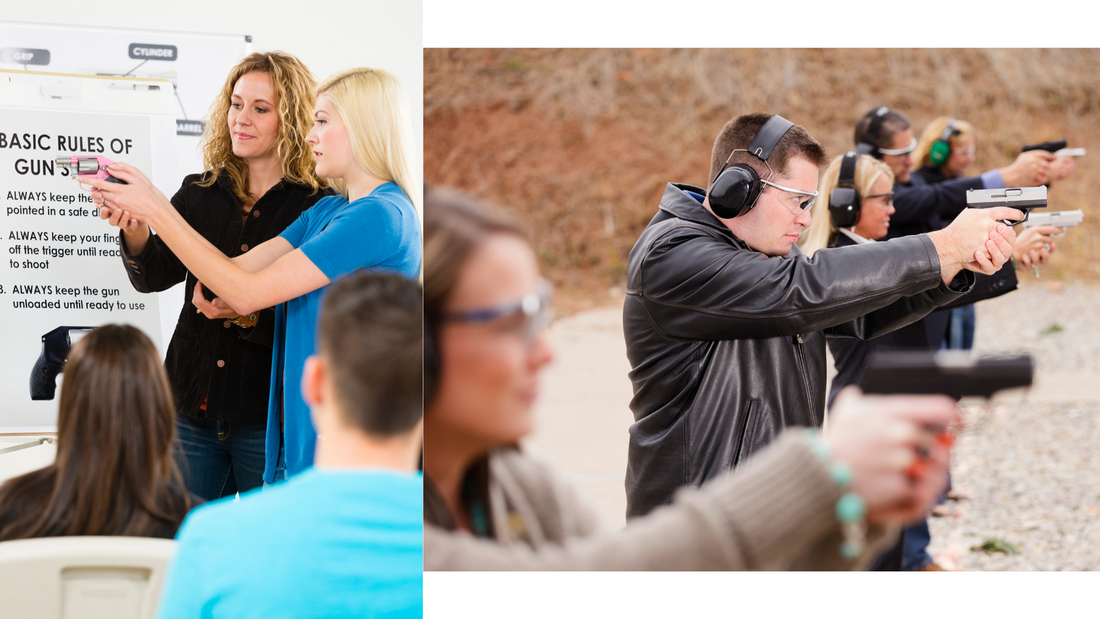Unlocking your potential as a responsible gun owner involves understanding the importance of License to Carry (LTC) classes. These classes provide a comprehensive foundation in firearm safety, legal knowledge, and personal security strategies, enhancing both your skills and your confidence. This blog will dive into the diverse benefits of LTC training and explain how it contributes not just to individual safety, but to responsible gun ownership within the community.
Unlocking the Power of the LTC: A Comprehensive Guide
What Skills Will You Learn in an LTC Class?
Obtaining your LTC (License to Carry) certification is a crucial step for responsible gun ownership and personal safety. But the benefits of an LTC class extend far beyond just firearm handling. In this section, we'll explore the diverse range of skills you'll gain through a comprehensive LTC training program.
Comprehensive Firearm Safety and Handling
- Proper firearm grip, stance, and trigger control
- Safe loading, unloading, and storage procedures
- Techniques for accurate and consistent shooting
Situational Awareness and Decision-Making
- Recognizing potential threats and high-risk environments
- Strategies for de-escalating confrontational situations
- Lawful use of force and when it is justified
- Ethical decision-making under pressure
How Does an LTC Class Enhance Your Safety Knowledge?
An LTC class is not just about learning to handle firearms; it's a holistic approach to personal safety and security. Through this training, you'll gain a deeper understanding of the legal, ethical, and practical aspects of responsible gun ownership and self-defense.
Legal Compliance and Liability Awareness
- Understanding federal, state, and local firearm laws
- Knowing your rights and responsibilities as a gun owner
- Avoiding potential legal pitfalls and liability issues
- Navigating the complex landscape of self-defense laws
Ethical Decision-Making and Conflict Resolution
- Developing a strong ethical framework for the use of force
- Strategies for de-escalating confrontations and avoiding violence
- Cultivating a mindset of responsible and restrained self-defense
Comprehensive Risk Assessment and Mitigation
- Identifying potential threats and vulnerabilities in your environment
- Implementing effective security measures for your home and vehicle
- Planning for emergency scenarios and developing contingency plans
- Incorporating safety protocols into your daily routine
What Are the Legal Aspects Covered in LTC Training?
Navigating the legal landscape surrounding firearms can be complex and daunting. However, a comprehensive LTC class ensures that you have a thorough understanding of the relevant laws and regulations, enabling you to make informed decisions and avoid potential legal pitfalls.
Firearm Ownership and Licensing Requirements
- Familiarization with federal, state, and local firearm laws
- Procedures for obtaining and maintaining LTC certification
- Regulations governing the purchase, possession, and storage of firearms
- Compliance with background checks and other legal requirements
Lawful Use of Force and Self-Defense Principles
- Detailed explanation of the legal justifications for the use of force
- Circumstances under which lethal force may be used in self-defense
- Potential legal consequences of unjustified or excessive use of force
Liability and Insurance Considerations
- Understanding the legal responsibilities and potential liabilities of gun owners
- Strategies for mitigating legal risks, such as proper storage and security measures
- Exploring the benefits and limitations of firearm liability insurance
- Navigating the legal process in the event of a self-defense incident
Reciprocity and Interstate Firearm Regulations
- Guidance on the recognition of LTC permits across different jurisdictions
- Familiarity with the laws and regulations governing firearm transportation and possession in other states
- Strategies for ensuring compliance when traveling with firearms
- Awareness of potential legal complications and how to address them
What Benefits Does LTC Offer Beyond Constitutional Carry?
In the ongoing debate around gun rights and responsibilities, the discussion often centers on the concept of "constitutional carry." While this approach provides a basic legal framework for firearm ownership, obtaining a License to Carry (LTC) can offer a range of additional benefits that extend beyond the bare minimum requirements.
Navigating the Nuances of Firearm Laws
- Obtaining an LTC demonstrates a deeper understanding of the complex web of federal, state, and local firearm regulations.
- By undergoing the LTC application process, gun owners gain valuable knowledge about the legal intricacies surrounding the purchase, possession, and use of firearms.
- This increased legal awareness can help gun owners avoid inadvertent violations and ensure they remain in compliance with all applicable laws.
Enhanced Reciprocity and Travel Considerations
- An LTC often provides reciprocity agreements with other states, allowing gun owners to carry their firearms across state lines with greater ease and confidence.
- This is particularly crucial for individuals who frequently travel or have a lifestyle that involves moving between different jurisdictions.
- The LTC can serve as a recognized and respected form of identification, facilitating seamless interactions with law enforcement and ensuring a smoother experience when exercising one's right to bear arms.
Proficiency and Training Requirements
- Obtaining an LTC typically involves demonstrating a certain level of firearm proficiency, including classroom instruction and practical shooting assessments.
- This training requirement helps ensure that gun owners possess the necessary skills and knowledge to handle their firearms safely and responsibly.
- By meeting these standards, LTC holders can develop a deeper understanding of firearm mechanics, maintenance, and appropriate use, ultimately contributing to a more informed and responsible gun-owning community.
How Can an LTC Help Foster Responsible Gun Ownership?
In addition to the legal and practical benefits of obtaining an LTC, this credential can also play a crucial role in promoting responsible gun ownership within the broader community.
Establishing a Culture of Accountability
- The LTC application process requires background checks, and a thorough review of the applicant's suitability to possess firearms.
- This vetting process helps create a culture of accountability, where gun owners are held to higher standards and demonstrate a genuine commitment to responsible firearm ownership.
- By setting a precedent of responsible behavior, LTC holders can serve as role models and ambassadors for the gun-owning community, reinforcing the importance of safe and lawful firearm usage.
Facilitating Constructive Dialogue
- Obtaining an LTC can open the door to more constructive dialogue between gun owners and non-gun owners, as it signals a willingness to engage with the legal system and follow established protocols.
- This shared understanding can foster greater trust and open communication, allowing for productive discussions on the complex issues surrounding gun rights and responsibilities.
- By leading by example, LTC holders can help bridge the divide and promote a more nuanced and collaborative approach to firearm-related policies and practices.
Why is Legal Knowledge Crucial for Gun Owners?
Navigating the intricate web of firearm laws and regulations is a crucial aspect of responsible gun ownership. Obtaining an LTC not only provides legal authorization to carry a firearm but also equips gun owners with the necessary knowledge to ensure their actions remain within the boundaries of the law.
Avoiding Unintentional Violations
- Firearm laws can be complex, with variations across federal, state, and local jurisdictions, as well as nuanced regulations regarding firearm storage, transportation, and use.
- Without a comprehensive understanding of these legal frameworks, gun owners may inadvertently violate statutes, leading to potentially severe consequences, such as fines or criminal charges.
- By obtaining an LTC, gun owners demonstrate a proactive commitment to understanding and complying with all applicable laws, minimizing the risk of unintentional infractions.
Ensuring Lawful Self-Defense and Use of Force
- The LTC process often includes training and education on the appropriate use of force, including the legal justifications and limitations surrounding self-defense.
- This knowledge equips gun owners with a deeper understanding of when and how they can legally utilize their firearms, helping them make informed decisions in potentially volatile situations.
- By being well-versed in the legal parameters of self-defense, LTC holders can navigate complex scenarios with greater confidence and reduce the likelihood of legal complications arising from the use of their firearms.
How Does Reciprocity Affect Your Travel Plans with an LTC?
When traveling with a firearm, it's essential to be aware of the reciprocity laws between states. Reciprocity refers to the mutual recognition of concealed carry permits or licenses, allowing individuals to legally carry their firearms across state lines.
The good news is that states such as Texas has an extensive network of reciprocity agreements with other states, which can provide significant benefits for Texas LTC holders.
- With a valid Texas LTC, you can legally carry your firearm in numerous other states, subject to their specific laws and regulations.
- This can be particularly useful for individuals who frequently travel for work or leisure, as it allows them to maintain their self-defense capabilities while away from home.
- It's important to note that the specific rules and restrictions may vary from state to state, so it's crucial to research the laws of your destination before traveling.
- Be sure to check if your state has reciprocity agreements in place
However, it's crucial to remember that not all states recognize the Texas LTC, and some may have different requirements or restrictions.
- For example, some states may require additional paperwork or registration for out-of-state permit holders.
- In some cases, you may need to obtain a nonresident permit or license from the state you plan to visit in order to legally carry your firearm.
- Failure to comply with the laws of the state you're visiting can result in serious legal consequences, including the confiscation of your firearm and potential criminal charges.
By understanding the reciprocity laws and planning your travel accordingly, you can ensure that your travel plans with a firearm go smoothly and avoid any legal issues. Staying informed and being proactive about compliance can help you maintain your self-defense capabilities while respecting the laws of the states you visit.
Q&A
What skills can I expect to learn in an LTC class?
In an LTC class, you'll learn firearm safety and handling, situational awareness, defensive driving techniques, and basic first aid skills. These comprehensive training modules prepare you for a variety of scenarios involving personal safety.
How does an LTC class improve legal knowledge?
An LTC class covers important aspects of firearm laws, including the lawful use of force, self-defense principles, liability awareness, and state-specific regulations. This foundational legal knowledge empowers gun owners to navigate complex situations confidently and responsibly.
What are the advantages of having an LTC over constitutional carry?
Having an LTC offers benefits such as enhanced reciprocity with other states, which allows for smoother travel with firearms. Additionally, LTC holders often receive training that reinforces safe and responsible firearm handling, which constitutional carry may not provide.
Why is ethical decision-making emphasized in LTC training?
LTC training emphasizes ethical decision-making to help gun owners develop a strong moral framework for using force. It teaches strategies for de-escalation and emphasizes responsible self-defense, making gun owners more accountable to their actions.
In conclusion, participating in an LTC class is more than just fulfilling a legal requirement; it's a commitment to responsible and informed gun ownership. The skills and knowledge acquired from these classes not only enhance personal safety but also promote a culture of accountability and ethical behavior within the community. As you consider your journey as a gun owner, remember that education and preparation can make all the difference in ensuring both your safety and that of others around you.

